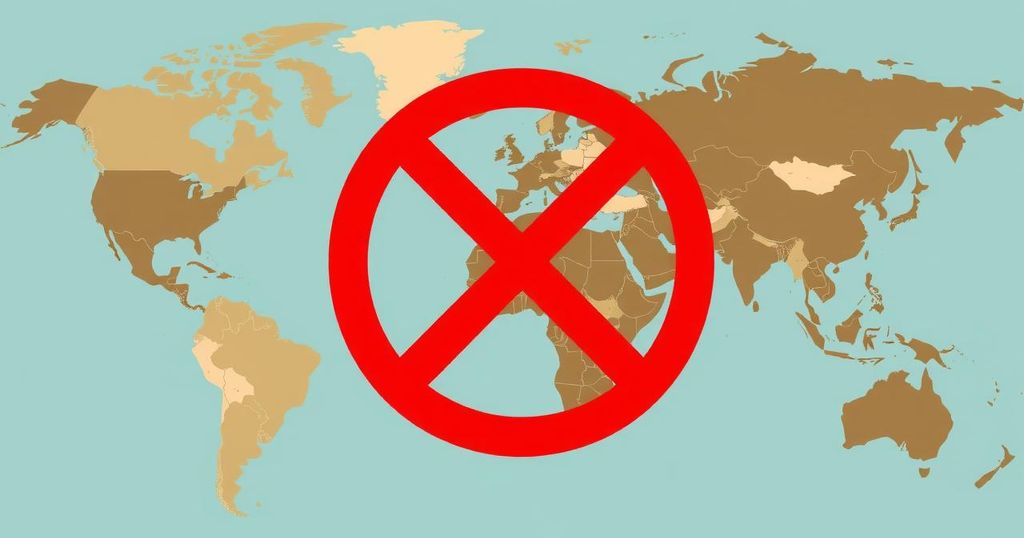World news
AFRICA, CUBA, DONALD TRUMP, JOE BIDEN, MYANMAR, NATIONAL SECURITY, NBC NEWS, NORTH AMERICA, POLITICS, SIERRA LEONE, SOUTH AMERICA, STATE DEPARTMENT, SUDAN, TRUMP, TRUMP ADMINISTRATION, TRUTH SOCIAL, U. S, U. S. STATE DEPARTMENT, U.S. ELECTIONS, US PRESIDENTIAL ELECTION, VENEZUELA
Fatima Alavi
0 Comments
Trump Issues New Travel Ban Affecting Nearly 20 Countries: What Travelers Need to Know
President Trump has enacted a new travel ban prohibiting or restricting entry from nearly 20 countries, citing national security. The ban mainly affects nations with high visa overstay rates and comes with exceptions for specific visa categories. The restrictions take effect on June 9, 2025, affecting travelers’ plans significantly. Individuals are encouraged to consult the U.S. State Department for the most recent guidance.
In a major move, President Donald Trump signed a new travel ban this Wednesday that impacts nearly 20 countries, citing national security as the main reason. The proclamation bars foreign nationals from Afghanistan, Burma, Chad, Republic of Congo, Equatorial Guinea, Eritrea, Haiti, Iran, Libya, Somalia, Sudan, and Yemen from entering the United States. Along with that, restrictions on nationals from Burundi, Cuba, Laos, Sierra Leone, Togo, Turkmenistan, and Venezuela will also come into play.
The White House indicated that the ban is aimed at countries that exhibit high visa overstay rates and are considered deficient in terms of screening and vetting protocols. There are echoes of the controversial 2017 “Muslim ban” which also had a significant impact on several predominantly Muslim countries. This previous policy faced numerous protests and legal battles, eventually being repealed by former President Joe Biden in 2021, who labeled it as “a stain on our national conscience.”
However, the new travel proclamation does offer some exceptions. Lawful permanent residents, current visa holders, and certain visa categories are not subject to the ban. Nonetheless, the exact qualifications for who might still be allowed entry under these exceptions remain unspecified, creating some uncertainty.
So, what does this mean for international travelers? Well, it might not be good news for many. Those applying for tourist, work, and student visas from the listed countries might face delays or even outright denials. For those already residing in the U.S., visa renewals may still occur but reentry complications are anticipated. This travel ban fulfills one of Trump’s campaign pledges ahead of the 2024 election and was announced following a recent antisemitic incident in Colorado. On his Truth Social platform, he remarked on the necessity of maintaining secure borders and deporting those he terms “Illegal, Anti-American Radicals” who pose threats to American safety.
As for the nationals affected, the new travel restrictions are set to kick in at 12:01 a.m. ET on June 9, 2025. Those trying to enter the U.S. via air from fully banned countries might be denied boarding by airlines or risk being turned away when they land. Nationals from partially restricted countries could face additional scrutiny, including delays based on their visa type or reason for traveling.
For travelers who have already secured tickets to the U.S., it’s advisable they reach out to their airlines and respective U.S. embassies or consulates. The majority of individuals from ban-affected countries are likely to face entry denial, while those from partially restricted nations might still be allowed to fly under stricter requirements. To stay updated, travelers should check the U.S. Department of State’s website or consult with an immigration attorney if there are any concerns regarding entry eligibility.
In summary, President Trump’s newly signed travel ban impacts nationals from nearly 20 countries, with significant restrictions aimed at those perceived as potential security concerns. Set to take effect on June 9, 2025, it may result in travel complications and added scrutiny for affected individuals. As travel resume plans unfold, it is crucial for travelers to stay informed and seek advice from legal experts if necessary.
Original Source: www.usatoday.com




Post Comment